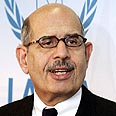
UN nuclear watchdog chief urges Iran to 'accelerate' cooperation
IAEA's ElBaradei calls on Tehran to clarify all outstanding issues regarding its nuclear enrichment program prior to agency's second, 'crucial' report. 'Iran to give IAEA comprehensive cooperation,' says Iranian vice president
The UN Nuclear watchdog chief pressed Iran on Friday to "accelerate" Its cooperation with his agency to so he can shed more light on Tehran's controversial nuclear program in an upcoming crucial report.
Mohamed ElBaradei, who heads the International Atomic Energy Agency, said he asked Iran for better transparency and assurances regarding the country's current nuclear activities.
"We discussed how we can work together to accelerate the pace of our cooperation to clarify all outstanding issues," said ElBaradei Friday, after meeting with Iran's Vice President Gholam Reza Aghazadeh.
ElBaradei characterized their talks as a "frank and open exchange of views." "I asked Mr. Aghazadeh to give us maximum transparency and provide assurances about all present nuclear activities about Iran. ... My mission here is to overcome the difficulties between IAEA and Iran," he said.
ElBaradei's trip to Iran is key because it will be the basis for a report on Iran by the UN agency that was supposed to be wrapped up by December, but was apparently postponed to March at Tehran's request.
The talks also come at a time when international concerns over Iran's program have mellowed in the wake of a US Intelligence report last month that concluded Iran had stopped its nuclear weapons program in late 2003 and had not resumed it since.
In November, an IAEA report said Iran had been truthful about its past uranium enrichment activities.
Aghazadeh insisted that Iran and the IAEA would have "comprehensive cooperation to fully resolve all outstanding issues" In hope that the country's nuclear dossier would be returned from the UN Security Council back to the Vienna, Austria-based IAEA.

Full disclosure? Iran's nuclear facility in Bushar (Photo: AP)
"In Iran, we believe Iran's nuclear issue is within the capacity of the IAEA, and we hope that all past and present issues will be resolved by March and the Iranian nuclear issue will return to the IAEA," said Aghazadeh, who also heads Iran's Atomic Energy Organization.
ElBaradei has spearheaded more than four years of international efforts to press Iran for full disclosure of its nuclear activities. On Saturday, he is scheduled to meet Iranian President Mahmoud Ahmadinejad, Iran's top nuclear negotiator, Saeed Jalili, and Supreme Leader Ayatollah Ali Khamenei, who has the final say in all Iranian matters.
'Comprehensive cooperation'
Aghazadeh said ElBaradei's unprecedented meeting with Khamenei will be crucial: "It will be an extremely important exchange of information," ghazadeh said.
The Security Council has imposed two rounds of economic sanctions against Iran for refusing to suspend uranium enrichment. While low enriched uranium can be used as nuclear fuel, high-level enrichment creates the fissile material used in nuclear warheads.
Tehran says it never worked on atomic weapons and wants to enrich only to generate electricity. The US and its allies say that - even if Iran no longer has an active weapons program - it can return to it, and then use its enrichment program to tip its missiles with nuclear payloads.
ElBaradei's trip overlaps with US President George W. Bush's own Middle East tour. Prior to ElBaradei's visit, US Secretary of State Condoleezza Rice urged him to press for full cooperation from Iran over its past nuclear activities.
"Iran has many questions that it needs to answer about its past behavior, they also need to account for what they're doing now," Deputy Spokesman Tom Casey said Thursday.
Last month, the IAEA and Iran began a round of discussions on to investigate the source of traces of weapons-grade uranium found at a university in Tehran. Iran has argued that the contamination was due to equipment purchased from abroad, not enrichment activity inside Iran.
Dudi Cohen contributed to this report










